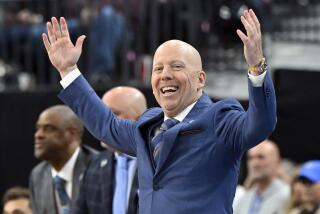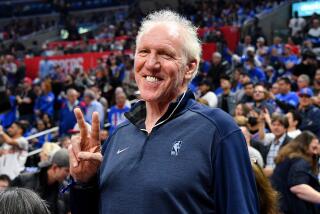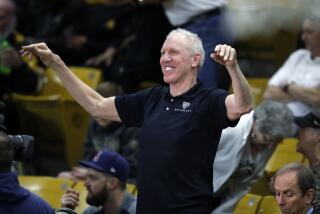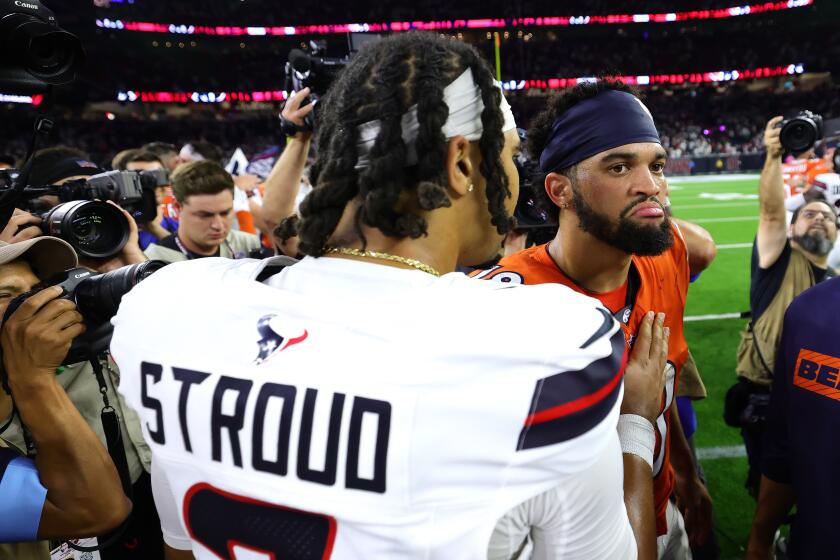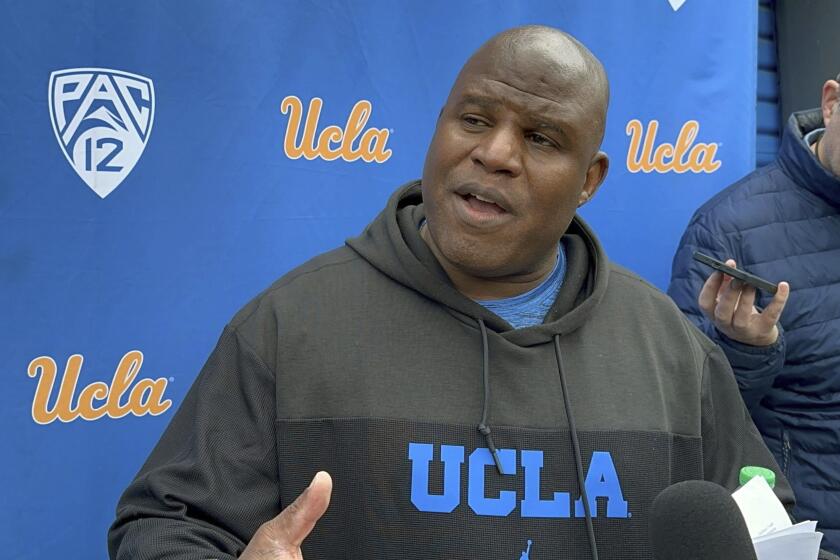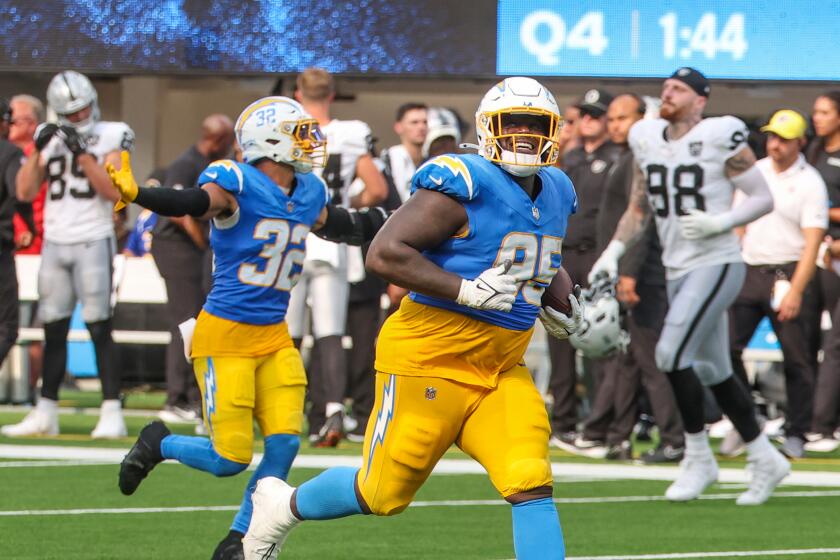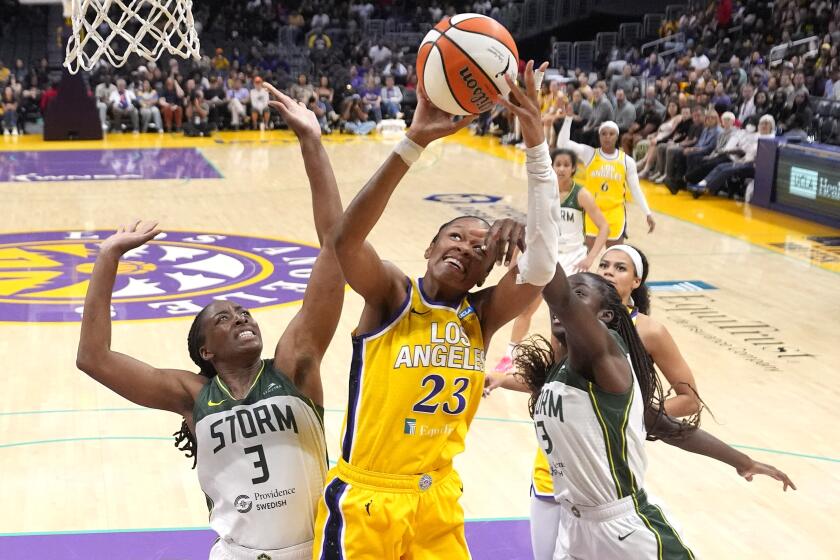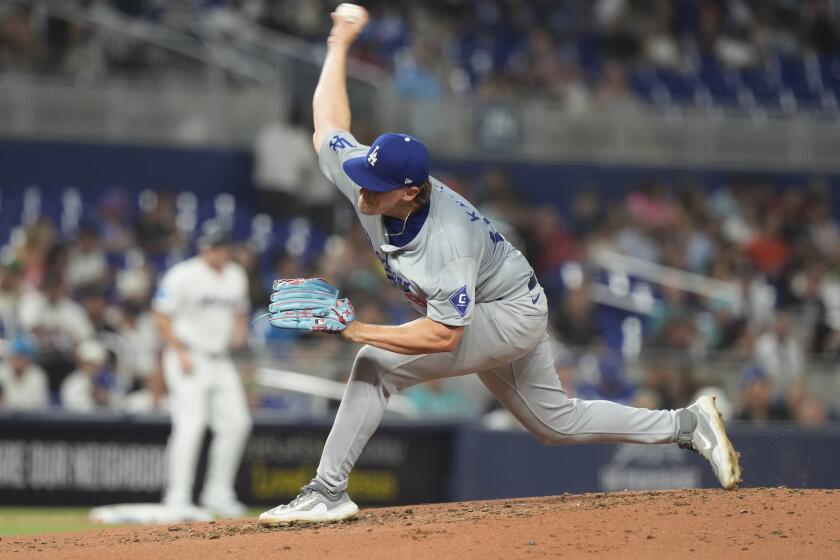Preeminent Domain
As he drove his Chevy north along the California coast, Ben Howland heard his cellphone ring.
Good news or bad?
Howland recently had heard enough of both to make a man laugh and cry. Behind him lay the bright promise of L.A. where, a month earlier, he had gotten his dream job, head basketball coach of the UCLA Bruins, fulfilling a goal that had begun just up the road at UC Santa Barbara, where he was an assistant for a dozen years.
Ahead lay the dim prospects for his father’s survival. Four days earlier, 77-year-old Bob Howland, a minister, had arrived at a wedding reception across the bay from San Francisco with his entire family, including son Ben and his family. The festivities were at the top of a hill. Bob had lost his balance and fallen to the bottom, and was in a coma.
FOR THE RECORD:
College basketball —In Monday’s special section on the NCAA tournament, an article about UCLA’s Jordan Farmar incorrectly stated that he led Woodland Hills Taft High to the City Section semifinals for the first time. Taft was in the semifinals once before, in 1964, and beat Banning in the consolation game to place third.
Now, into Ben’s emotional maelstrom came a call that would help lift his spirits. On the phone was one of the premier college prospects in the nation, the object of a furious recruiting battle, a 16-year-old point guard named Jordan Farmar who was in his junior year at Woodland Hills Taft High.
Yes, Farmar told Howland, he had decided to stay home and attend school right down the 405 Freeway at UCLA.
It was Howland’s 46th birthday, a happy day after all.
There would be no joy at the end of his drive, though. Twenty-two days later, he would lose his father. But for a day at least, he had reason to celebrate. He had landed a major talent in Farmar, and in doing so had emulated John Wooden, the coach who had set the standard of excellence at UCLA.
Wooden always believed the best players around should stay close to home.
In building UCLA’s basketball dynasty, Wooden considered Southern California something of a private recruiting domain.
“That’s one of the things that makes this program so special and has over the years,” Howland said. “There has always been a plethora of great [local] players.”
Farmar, UCLA’s floor leader almost from the time he first stepped onto the Pauley Pavilion court last season, is a prime example. And there are many others.
Consider this short list of locally produced former UCLA stars: Gail Goodrich from Sun Valley Poly High, Keith Erickson from El Segundo, Lynn Shackelford from Burbank Burroughs, Curtis Rowe from Fremont, Sidney Wicks from Hamilton, Greg Lee from Reseda, Dave Meyers from La Habra Sonora, Marques Johnson from Crenshaw, David Greenwood from Verbum Dei, Don MacLean from Simi Valley, Ed O’Bannon from Lakewood Artesia, Tyus Edney from Long Beach Poly, and Baron Davis from Santa Monica Crossroads.
“With the wealth of talent in this area I always concentrated on a few local kids, that was so important,” Wooden said. “I would settle on about five and hope to get two or three. And if you can do that, then you start to attract players from elsewhere. You’re always going to have the parents wanting their children to play close to home.”
UCLA isn’t the only college to successfully use that tactic in the recruiting wars.
Adam Morrison from Spokane and Gonzaga, Steve Novak from suburban Milwaukee and Marquette, Kyle Lowry from Philadelphia and Villanova, and Shawne Williams from Memphis are among several college stars expected to play key roles for their hometown teams during the NCAA tournament.
It was never a given that Farmar would become a Bruin. Far from it. He initially crossed UCLA off his list.
The quality of the academic program was a strong factor for Farmar in choosing a school. His parents, Damon Farmar and Mindy Kolani, who are divorced, insisted on it.
Academics was the reason Farmar, as a sophomore, transferred from Van Nuys Birmingham High to Taft. “Jordan is a gifted student,” Kolani said. “His transfer to Taft had nothing to do with basketball. And he thrived there.”
On the court as well as in the classroom.
After sitting out his 10th-grade season because of the transfer, Farmar was having the type of junior year that made college coaches raise their eyebrows. He averaged 28.5 points, 8.0 rebounds, 5.9 assists and 4.5 steals in leading Taft to a 25-6 record and to the City Section semifinals for the first time in school history.
Gonzaga was the first major program to make a big push for Farmar. When the school’s basketball team came to town for a game against Pepperdine, it arrived en masse for a game at Taft and sat in the stands to root for Farmar.
“That was cool,” Damon Farmar said.
Jordan already had an emotional tie to the state of Washington. Damon, a former professional baseball player, had been a hitting coach for the Yakima Bears, a Dodger farm team. Jordan came up to visit him, got a Gonzaga T-shirt, and found that he loved the area and the school, which is in Spokane, about 160 miles northeast of Yakima.
But Gonzaga soon had plenty of company. Florida Coach Billy Donovan expressed interest and Farmar was impressed by the fact that Donovan had also been a point guard, at Providence.
“Jordan was like a kid in a candy shop with the schools that wanted him,” Kolani said. “But everybody wants to sell you something. Because they want you, they say anything you want to hear. We wanted to go with people we trusted.”
So where was UCLA?
Bruin coach Steve Lavin came out to see Farmar in his junior year, but it turned out to be a poor game by the Taft guard.
“Jordan didn’t play well,” Taft Coach Derrick Taylor said. “He struggled and tried to force shots.”
When Lavin didn’t follow up, Farmar and his parents figured that was it for Westwood.
“I didn’t think he was impressed with Jordan,” Kolani said.
Not so, Lavin said. The problem wasn’t with Farmar’s future. It was with his own.
With the Bruins struggling, Lavin was convinced his dismissal, which he said he had been expecting for several seasons, was finally coming. And, he said, he wasn’t about to lie to Farmar or other prospects and promise them he’d be there for them.
“To say I was not interested in Jordan Farmar is ridiculous,” said Lavin, now a college basketball commentator for ESPN. “He did not have an exceptional game that night, but you could see his incredible gifts. You could see that the ball was an extension of him on the court. There are all kinds of stories about a very good player who has an off night when you see him, or a player who has an exceptional game that doesn’t really reflect his ability. You can’t just go by that.
“But there was a very strong consensus by then that I was not going to be the coach at UCLA for very long. By the time he was a college freshman, it was pretty clear I was not going to be at UCLA. That paralyzed my staff’s ability and effectiveness to recruit. I am not going to lie to a recruit and his family and say, ‘Oh, everything’s fine. I’ve got a long-term contract.’ That whole situation clearly puts you at a disadvantage against programs that offer a picture of stability.
“It was not only Jordan and Arron Afflalo, who was also being recruited at the time, but kids all across the country in that class didn’t get the conventional level of recruiting from UCLA because it was clear I was going to be out the door at the end of the season.”
With the Bruins seemingly out of the picture, Farmar still had other choices. But the young man whom his mother had compared to a kid in a candy store — all those possibilities — was now getting a headache from all the sweets being offered him.
“It got stressful, the calls at school, the calls at home,” Farmar said. “They all said the same stuff. You come here and we’ll do this and we’ll do that. Everybody has their own angle, but it’s the same thing over and over again. It gets tiring, frustrating.”
Farmar decided to put an end to the stress by announcing his decision at the end of his junior year.
That meant time was running out for UCLA.
On April 3, 2003, Howland was hired to replace Lavin.
His first order of business: Get Farmar and another key hometown recruit, Afflalo, who was starring for Compton Centennial High.
By NCAA rules, the first day Howland could contact either player was April 9. He wanted to come out to Taft on that day and visit with Farmar, his family and his coach.
But Farmar, who had decided he wanted to go away to school, wasn’t interested, according to his high school coach.
“I told Jordan that he at least owed UCLA a visit,” Taylor said, “out of respect for the local school. ‘Don’t just say no,’ I told him. ‘It’s not fair to just rule them out.’ ”
Farmar agreed to the meeting.
“I talked to [Howland] and told him we had other meetings scheduled that day,” Kolani said. “But he said to me, ‘No, I want to be the first one out there.’ ”
Howland got his audience with Farmar, his family and Taylor.
“Ben’s presentation was so dynamic, very intense,” Taylor said. “When we walked out of there, Jordan asked me what I thought. I said, ‘Heck, if I had some eligibility left, I’d sign with him.’ The guy jumped into the picture quick and put UCLA back in the hunt right there, right on the spot.”
Just like that, UCLA made Farmar’s personal Final Four — Florida, Gonzaga and Arizona being the others still in contention. At the suggestion of his parents, Farmar listed in writing the pros and cons of each college.
“We had him put it in terms of his priorities,” Damon said. “He put basketball first and added stuff like where he’d be living, education, business opportunities, the chance to network. When he was done, I told him to turn the list upside down, which would put basketball at the bottom, because, as a parent, I was looking to his life beyond basketball.”
Both parents said they didn’t push Jordan in any direction, trusting that once he considered all the facts he’d make the right call. But Damon admitted he gave a gentle nudge one night at his house, where he and Jordan had gathered with some friends — including former major leaguer Eric Davis, a friend of Damon’s who is Jordan’s godfather.
As they played H-O-R-S-E outside, several in the group, including Davis, began singing the UCLA fight song on a cue from Damon.
“I told Jordan there were not a lot of schools,” Damon said, “whose fight song was known by people all over the country.”
Jordan was now leaning toward UCLA, but Donovan didn’t give up. On the morning Farmar made his decision, Taylor counted 11 calls from Donovan between 8 a.m. and noon.
But in the end, Howland got his men — Farmar and Afflalo.
That was a good day for the UCLA coach too.
The two local kids have become the Bruins’ leading scorers, and for Farmar the decision to stay home and attend UCLA has been everything he envisioned.
He was Pacific 10 Conference freshman of the year last season, and this season he and Afflalo were first-team all-conference selections after pacing the Bruins to their first Pac-10 regular-season championship in nine years, and their first Pac-10 tournament title since 1987.
“Being an L.A. kid,” Farmar said, “ I saw this as an opportunity to help restore the UCLA program to what it used to be.
“My friends and family are able to see me play. Even taking basketball out of the equation, it’s a chance to get a good education and network for opportunities in the real world, give me a better future beyond basketball. That’s what college is for.”
“I think I made the best decision, I’m happy and I’m glad to have gone through the recruiting experience.”
More to Read
Go beyond the scoreboard
Get the latest on L.A.'s teams in the daily Sports Report newsletter.
You may occasionally receive promotional content from the Los Angeles Times.
